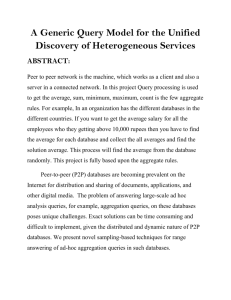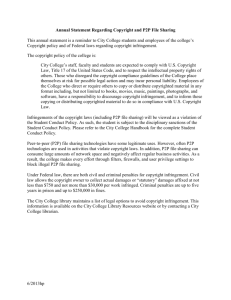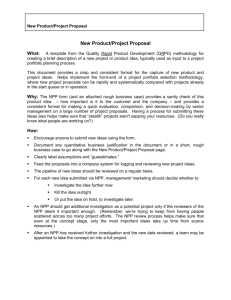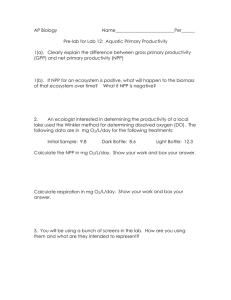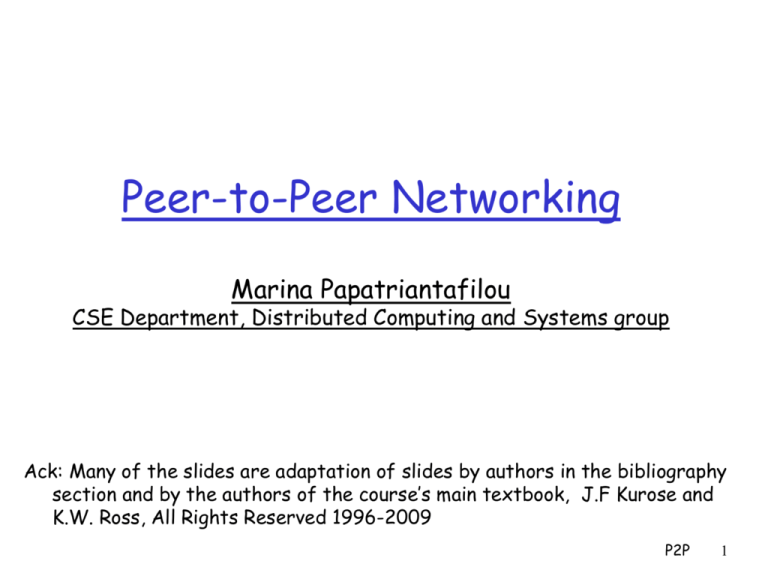
Peer-to-Peer Networking
Marina Papatriantafilou
CSE Department, Distributed Computing and Systems group
Ack: Many of the slides are adaptation of slides by authors in the bibliography
section and by the authors of the course’s main textbook, J.F Kurose and
K.W. Ross, All Rights Reserved 1996-2009
P2P
1
Intro
r Quickly grown in popularity
Dozens or hundreds of file sharing applications
many million people worldwide use P2P networks
Audio/Video transfer now dominates traffic on the
Internet
r But what is P2P?
Searching or location?
Computers “Peering”?
Take advantage of resources at the edges of
the network
• End-host resources have increased dramatically
• Broadband connectivity now common
P2P
2
Pure P2P architecture
r no always-on server
r arbitrary end systems
directly communicate peer-peer
r peers are intermittently
connected and change IP
addresses
r Three topics:
Searching for information
File distribution
Case Study: Skype
2: Application Layer
3
First steps in p2p file sharing/lookup
r Centralized Database
Napster
r Query Flooding
Gnutella
r Hierarchical Query Flooding
r …
KaZaA
P2P
4
P2P: centralized directory
original “Napster” design (1999, S.
Fanning)
1) when peer connects, it informs
central server:
Bob
centralized
directory server
1
peers
IP address, content
2) Alice queries directory server
for “Boulevard of Broken
Dreams”
3) Alice requests file from Bob
Problems?
Single point of failure
Performance bottleneck
Copyright infringement
1
3
1
2
1
Alice
P2P
5
Napster: Publish
insert(X,
123.2.21.23)
...
Publish
I have X, Y, and Z!
123.2.21.23
P2P
6
Napster: Search
123.2.0.18
Fetch
Query
search(A)
-->
123.2.0.18
Reply
Where is file A?
P2P
7
Napster: Discussion +, - ?
r +:
Simple
Search scope is O(1)
r -:
Server maintains O(N) State
Server does all processing
Single point of failure
P2P
8
First steps in p2p file sharing/lookup
r Centralized Database
Napster
r Query Flooding
Gnutella
r Hierarchical Query Flooding
r …
KaZaA
P2P
9
Gnutella: Overview
r Query Flooding:
Join: on startup, client contacts a few
other nodes; these become its
“neighbors”
Publish: no need
Search: ask neighbors, who ask their
neighbors, and so on... when/if found,
reply to sender.
Fetch: get the file directly from peer
P2P
10
Gnutella: Search
I have file A.
I have file A.
Reply
Query
Where is file A?
P2P
11
Gnutella: protocol
• Query message
sent over existing TCP
connections
• peers forward
Query message
• QueryHit
sent over
reverse
Query
path
File transfer:
HTTP
Query
QueryHit
QueryHit
Scalability:
limited scope
flooding
P2P
12
Query flooding: Gnutella
r Pros:
Fully de-centralized
Search cost distributed
overlay network:
r edge between peer X
and Y if there’s a TCP
r Cons:
connection
Search scope is O(N)
r all active peers and
Search time is O(???)
edges is overlay net
• But can limit to some
distance
r Edge is not a physical
Sensitive to churn
link
r Given peer will
typically be connected
with < 10 overlay
neighbors
What is routing in p2p info-sharing networks?
P2P
13
First steps in p2p file sharing/lookup
r Centralized Database
Napster
r Query Flooding
Gnutella
r Hierarchical Query Flooding
r …
KaZaA
P2P
14
KaZaA: Overview
r “Smart” Query Flooding:
Join: on startup, client contacts a “supernode” ... may at
some point become one itself
Publish: send list of files to supernode
Search: send query to supernode, supernodes flood query
amongst themselves.
Fetch: get the file directly from peer(s); can fetch
simultaneously from multiple peers
P2P
15
KaZaA: Network Design
“Super Nodes”
P2P
16
KaZaA: File Insert
insert(X,
123.2.21.23)
...
Publish
I have X!
123.2.21.23
P2P
17
KaZaA: File Search
search(A)
-->
123.2.22.50
123.2.22.50
Query
Replies
search(A)
-->
123.2.0.18
Where is file A?
123.2.0.18
P2P
18
KaZaA: Discussion
r
Pros:
Tries to take into account node heterogeneity:
• Bandwidth
• Host Computational Resources
• Host Availability (?)
r
Cons:
r
Rumored to take into account network locality
Still no real guarantees on search scope or search time
P2P architecture used by Skype, Joost (communication,
video distribution p2p systems)
P2P
19
Next steps in p2p networking
Centralized Database
Napster
Query Flooding
Gnutella
Hierarchical Query Flooding
KaZaA
…
Academia: “we can show how to do this better” :)
Motivation:
•
•
•
•
Frustrated by popularity of all these “half-baked” P2P apps :)
Guaranteed lookup success for files in system
Provable bounds on search time
Provable scalability to millions of node
Hot Topic in networking ever since
P2P
20
Next steps in p2p netwoking
Structured Overlay Organization and Routing
Distributed Hash Tables
Swarming
…
BitTorrent
P2P
21
Distributed Hash Table (DHT)
DHT = distributed P2P database
Database has (key, value) pairs;
key: ss number; value: human name
key: content type; value: IP address
Peers query DB with key
DB returns values that match the key
Peers can also insert (key, value) peers
DHT Identifiers: e.g:
Assign integer identifier to each peer in range
[0,2n-1].
Each identifier can be represented by n bits.
Require each key to be an integer in same range.
To get integer keys, hash original key.
eg, key = h(“Led Zeppelin IV”)
This is why they call it a distributed “hash” table
How to assign keys to peers? E.g.
Central issue:
Assigning (key, value) pairs to peers.
Rule: assign key to the peer that has the
closest ID.
Convention in lecture: closest is the
immediate successor of the key.
Ex: n=4; peers: 1,3,4,5,8,10,12,14;
key = 13, then successor peer = 14
key = 15, then successor peer = 1
Circular DHT (1)
1
3
15
4
12
5
10
8
Each peer only aware of immediate successor
and predecessor.
“Overlay network”
Circle DHT (2)
O(N) messages
on avg to resolve
query, when there
are N peers
0001
I am
Who’s resp
0011
for key 1110 ?
1111
1110
0100
1110
1110
1100
1110
1110
Define closest
as closest
successor
1010
1110
1000
0101
Circular DHT with Shortcuts
1
3
15
Who’s resp
for key 1110?
4
12
5
10
8
Each peer keeps track of IP addresses of
predecessor, successor, + shortcuts.
Possible to design shortcuts so O(log N) neighbors,
O(log N) messages in query:
Query simulates binary search (divide and conquer)
Reduced from 6 to 2 messages.
Peer Churn
1
•To handle peer churn, require
3
15
4
12
5
10
8
each peer to know the IP address
of its two successors.
• Each peer periodically pings its
two successors to see if they
are still alive.
Peer 5 abruptly leaves
Peer 4 detects; makes 8 its immediate successor;
asks 8 who its immediate successor is; makes 8’s
immediate successor its second successor.
What if peer 13 wants to join?
Common DHT structures for P2P
overlays/searching
Chord: ring with ”chords” (i.e. Shortcuts), works as
binary tree
Content-Addressable Network (CAN) topological
routing (k-dimensional grid)
Tapestry, Pastry, DKS: ring organization as Chord,
other measure of key closeness, k-ary search
instead of binary search paradigm
Kademlia: tree-based overlay
Viceroy: butterfly-type overlay network
....
P2P
29
Next steps in p2p netwoking
Structured Overlay Organization and Routing
Distributed Hash Tables
Swarming
…
BitTorrent
P2P
30
All Peers Equal?
1.5Mbps DSL
1.5Mbps DSL
QuickTime™ and a
TIFF (Uncompress ed) dec ompres sor
are needed to s ee this pic ture.
56kbps Modem
1.5Mbps DSL
10Mbps LAN
1.5Mbps DSL
56kbps Modem
56kbps Modem
P2P
31
BitTorrent: Overview
Swarming:
Join: contact centralized “tracker” server, get
a list of peers.
Publish: can run a tracker server.
Search: Out-of-band. E.g., use Google, some
DHT, etc to find a tracker for the file you
want. Get list of peers to contact for
assembling the file in chunks
Fetch: (FOCUS)Download chunks of the file
from your peers. Upload chunks you have to
them.
P2P
32
File distribution: BitTorrent
P2P file distribution
tracker: tracks peers
participating in torrent
torrent: group of
peers exchanging
chunks of a file
obtain list
of peers
trading
chunks
peer
2: Application Layer
33
BitTorrent: Tit-for-tat
(1) Alice “optimistically unchokes” Bob
(2) Alice becomes one of Bob’s top-four providers; Bob reciprocates
(3) Bob becomes one of Alice’s top-four providers
With higher upload rate,
can find better trading
partners & get file faster!
34
BitTorrent – joining a torrent
new leecher
2 join
tracker
peer
list
metadata
file
1
3
data
request
4
Peers divided into:
seeds: have the entire file
leechers: still downloading
website
seed/leeche
r
1. obtain the metadata file
2. contact the tracker
3. obtain a peer list (contains seeds & leechers)
4. contact peers from that list for data
BitTorrent – exchanging data
leecher B
leecher A
I
have
seed
leecher C
● Verify pieces
using hashes
● Download sub-pieces in parallel
● Advertise received pieces to the entire peer
list
● Look for the rarest pieces
!
BitTorrent - unchoking
leecher B
leecher A
seed
leecher D
leecher C
● Periodically calculate data-receiving rates
● Upload to (unchoke) the fastest downloaders
● Optimistic unchoking
▪ periodically select a peer at random and upload to it
▪ continuously look for the fastest partners
BitTorrent (1)
file divided into 256KB chunks.
peer joining torrent:
has no chunks, but will accumulate them over time
registers with tracker to get list of peers,
connects to subset of peers (“neighbors”)
while downloading, peer uploads chunks to other
peers.
peers may come and go
once peer has entire file, it may (selfishly) leave or
(altruistically) remain
38
BitTorrent (2)
• Sending Chunks: tit-for-tat
Pulling Chunks
• Alice sends chunks to (4)
at any given time,
neighbors currently sending
different peers have
her chunks at the highest
different subsets of
rate
file chunks
• re-evaluate top 4 every
periodically, a peer
10 secs
(Alice) asks each
neighbor for list of
• every 30 secs: randomly
chunks that they have.
select another peer, starts
sending chunks
Alice sends requests
for her missing chunks
• newly chosen peer may
join top 4
rarest first
• “optimistically unchoke”
39
BitTorrent: Sharing Strategy
“Tit-for-tat” sharing strategy
“I’ll share with you if you share with me”
Be optimistic: occasionally let freeloaders download
• Otherwise no one would ever start!
• Also allows you to discover better peers to download from
when they reciprocate
Approximates Pareto Efficiency
Game Theory: “No change can make anyone better off
without making others worse off”
P2P
40
BitTorrent: Discussion
Pros:
Works reasonably well in practice
Gives peers incentive to share resources; avoids
freeloaders to some extend
Cons:
Central tracker server needed to bootstrap
swarm
P2P
41
Discussion bittorrent, gaming,
fairness, etc
Gaming Incentives, tuning of behaviour
Other issues: sybil attacks
Literature, evolution: includes currency,
economic games (but brings problems with
inflation, etc like in real economics
systems)
Evolving literature, including economic and
social sciences
Related issue: information dissemination?
P2P
42
File Distribution: Server-Client vs P2P
Question : How much time to distribute file
from one server to N peers?
us: server upload
bandwidth
Server
us
File, size F
dN
uN
u1
d1
u2
ui: peer i upload
bandwidth
d2
di: peer i download
bandwidth
Network (with
abundant bandwidth)
2: Application Layer
43
File distribution time: server-client
server sequentially
sends N copies:
NF/us time
client i takes F/di
time to download
Time to distribute F
to N clients using
client/server approach
Server
F
us
dN
u1 d1 u2
d2
Network (with
abundant bandwidth)
uN
= dcs depends on
max { NF/us, F/min(d
)}
ii
increases linearly in N
(for large N) 2: Application Layer
44
File distribution time: P2P
Server
server must send one
F
u1 d1 u2
d2
copy: F/us time
us
client i takes F/di time
Network (with
dN
to download
abundant bandwidth)
uN
NF bits must be
downloaded (aggregate)
fastest possible upload rate: us + Sui
dP2P depends on max { F/us, F/min(di) , NF/(us +
i
Sui) }
2: Application Layer
45
Server-client vs. P2P: example
Client upload rate = u, F/u = 1 hour, us = 10u, dmin ≥ us
Minimum Distribution Time
3.5
P2P
Client-Server
3
2.5
2
1.5
1
0.5
0
0
5
10
15
20
25
30
35
N
2: Application Layer
46
Overview
First steps in p2p, file sharing
Next steps: structure, performance (DHTs, bit-torrent)
NEXT ? …
Observe: Application-layer networking
P2P
47
P2P – not only sharing files…
• Content delivery, software publication
• Streaming media applications
• Distributed computations (volunteer
computing)
• Portal systems
• Distributed search engines
• Collaborative platforms
• Communication networks
• Social applications
• Other overlay-related applications....
Overlay: a network
implemented on top of a
network
E.g. Peer-to-peer
networks, ”backbones”
in adhoc networks,
transportaiton network
overlays, ...
P2P Case study: Skype
Skype clients (SC)
inherently P2P: pairs
of users communicate.
proprietary
Skype
login server
application-layer
protocol (inferred via
reverse engineering)
hierarchical overlay
with SNs
Index maps usernames
to IP addresses;
distributed over SNs
Supernode
(SN)
2: Application Layer
49
Peers as relays
Problem when both
Alice and Bob are
behind “NATs”.
NAT prevents an outside
peer from initiating a call
to insider peer
Solution:
Using Alice’s and Bob’s
SNs, Relay is chosen
Each peer initiates
session with relay.
Peers can now
communicate through
NATs via relay
2: Application Layer
50
More on examples : New power grids
Natural overlays
Bibliography (arbitrary order)
Do Incentives build Robustness in BitTorrent?, Michael Piatek, Tomas Isdal,
Thomas Anderson, Arvind Krishnamurthy and Arun Venkataramani, NSDI
2007.
Law and Economics: The Prisoners’ Dilemma
mason.gmu.edu/~fbuckley/documents/PrisonersDilemma.ppt
Exploiting BitTorrent For Fun (But Not Profit)
iptps06.cs.ucsb.edu/talks/Liogkas_BitTorrent.ppt
Aberer’s coursenotes
http://lsirwww.epfl.ch/courses/dis/2007ws/lecture/week%208%20P2P%
20systems-general.pdf
http://lsirwww.epfl.ch/courses/dis/2007ws/lecture/week%209%20Struc
tured%20Overlay%20Networks.pdf
Chord presentation by Cristine Kiefer, MPII Saarbruecken
www.mpi-inf.mpg.de/departments/d5/teaching/ws03_04/p2p-data/11-18writeup1.pdf
www.mpi-inf.mpg.de/departments/d5/teaching/ws03_04/p2p-data/11-18paper1.ppt
Kurose, Ross: Computer Networking, a top-down approach, AdisonWesley 2009
P2P
52
Bibliography (cont)
Kademlia: A Peer to peer information system Based on the XOR Metric. Petar Maymounkov
and David Mazières , 1st International Workshop on Peer-to-peer Systems, 2002.
Pastry: Scalable, distributed object location and routing for large-scale peer-to-peer
systems, A. Rowstron and P. Druschel, IFIP/ACM International Conference on Distributed
Systems Platforms (Middleware), November 2001.
Chord: A Scalable Peer-to-peer Lookup Service for Internet Applications, Ion Stoica,
Robert Morris, David Karger, M. Frans Kaashoek, and Hari Balakrishnan. ACM SIGCOMM
2001, San Deigo, CA, August 2001, pp. 149-160.
A Scalable Content-Addressable Network, S. Ratnasamy, P. Francis, M. Handley, R. Karp,
and S. Shenker, Sigcomm 2001, San Diego, CA, USA, August, 2001.
Incentives build Robustness in BitTorrent, Bram Cohen. Workshop on Economics of Peerto-Peer Systems, 2003.
Ian Clarke, Oskar Sandberg, Brandon Wiley, and Theodore W. Hong. Freenet: A
Distributed Anonymous Information Storage and Retrieval System. Int’l Workshop on
Design Issues in Anonymity and Unobservability. LLNCS 2009. Springer Verlag 2001.
Viceroy: A Scalable and Dynamic Emulation of the Butterfly. By D. Malkhi, M. Naor and D.
Ratajczak. In Proceedings of the 21st ACM Symposium on Principles of Distributed
Computing (PODC '02), August 2002. Postscript.
P2P
53
Bibliography cont.
http://en.wikipedia.org/wiki/Chord_(DHT)
http://en.wikipedia.org/wiki/Tapestry_(DHT)
http://en.wikipedia.org/wiki/Pastry_(DHT)
http://en.wikipedia.org/wiki/Kademlia
http://en.wikipedia.org/wiki/Content_addressable_network
http://en.wikipedia.org/wiki/Comparison_of_file_sharing_applications
P2P
54

